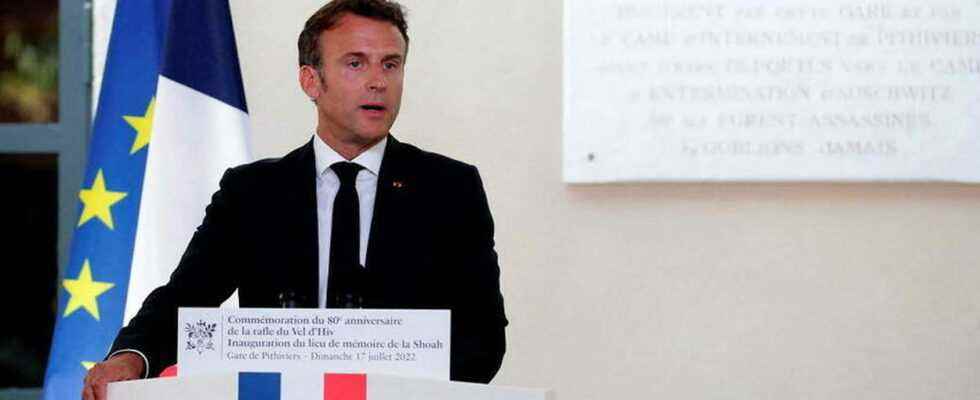DSunday July 17, Emmanuel Macron spoke on the occasion of the 80e anniversary of the Vél’ d’Hiv roundup and inaugurated, in the company of survivors, a new place of remembrance in the former station of Pithiviers (Loiret), from where eight convoys departed for Auschwitz-Birkenau. The President of the Republic called on “the Republican forces” to “redouble their vigilance” in the face of “even more burning” and “creeping” anti-Semitism than 20 years ago, in a speech in Pithiviers (Loiret) commemorating the 80e anniversary of the Vel’ d’Hiv roundup.
“Neither Pétain, nor Laval, nor Bousquet, nor Darquier de Pellepoix, none of them wanted to save Jews. It is a falsification of history to say so”, also hammered the head of state, considering that “those who indulge in these lies have the project of destroying the Republic and the unity of the nation”.
“The odious anti-Semitism is rampant”
Emmanuel Macron took up the words of Jacques Chirac who, in 1995, had recognized France’s responsibility in the Vel’ d’Hiv roundup: “These dark hours forever defile our history. France that day accomplished the irreparable. From now on, anti-Semitism “can take on other faces, wrap itself in other words, other caricatures,” said Emmanuel Macron. “But the odious anti-Semitism is there, it lurks, still alive, persists, persists, returns”, he continued, evoking in turn the “terrorist barbarism”, the “assassinations and crimes”, the resurgences on “social networks” or “tomb desecrations”.
“He interferes in debates on television sets. It plays on the complacency of certain political forces. It also thrives around a new form of historical revisionism, even denial,” he insisted, alluding, without naming him, to the far-right candidate for the presidential election Éric Zemmour who had notably argued that Marshal Pétain had “saved” French Jews during the Second World War.
Pithiviers station, symbol of the Vél’ d’Hiv roundup
Accompanied by several personalities, including the historian Serge Klarsfeld, the survivor of the camps Ginette Kolinka, or even the CEO of the SNCF Jean-Pierre Farandou, Emmanuel Macron gave a speech in the small station of Pithiviers, a hundred kilometers south of Paris, which has not welcomed travelers since the end of the 1960s and which has just been transformed into a museum by the Shoah Memorial.
It was through this station that some of the 13,000 Jews transited, including 4,115 children arrested in Paris and the suburbs on July 16, 1942 and the following days by 9,000 French officials, at the request of the Germans. 8,160 of them, including the elderly and the sick, were taken to the Vélodrome d’Hiver stadium in the 15e district of Paris. Before being evacuated to the camps of Drancy (Seine-Saint-Denis), Pithiviers and Beaune-la-Rolande (Loiret).
From Pithiviers station alone, eight convoys then left for the extermination camps, for more than 8,000 deportees, making it the second largest deportation site in France after Drancy. Only a few dozen adults will survive. “This station is the place where the French event becomes European genocide. […] It’s a unique place of memory in France,” says Jacques Fredj, director of the Shoah Memorial.
READ ALSORoundup of the Vél’ d’Hiv: the unfolding of the facts
At the same time, Prime Minister Élisabeth Borne attended the traditional ceremony in the morning on the site of the former Vélodrome d’Hiver, in the presence in particular of the PS mayor of Paris Anne Hidalgo. “80 years ago, France was lost and committed the irreparable,” said Mme Borne, for whom “these July days, as during the roundups that followed, France lost a bit of its soul”. “Courage is in recognizing it and commemorating it,” she continued, adding that “the fight against anti-Semitism never stops.”
“Commonalisation”
The 400 square meter site, which still belongs to the SNCF, is particularly intended for schoolchildren. “It is a priority in the face of the rise of anti-Semitism, racism and conspiracy,” explains Jacques Fredj. A room in the station is devoted to a poignant photo report on the so-called “green ticket” roundup, the first mass arrest of 3,700 foreign Jews in France, on May 14, 1941. Another room traces “the litany of eight convoys” to Auschwitz-Birkenau, projecting photos of murdered deportees onto giant screens.
After fifty years of silence from the French authorities, Jacques Chirac had recognized in 1995 the responsibility of France in the Rafle du Vél ‘d’Hiv, in a speech that remained engraved in the memories. “France, that day, accomplished the irreparable,” he had launched.
READ ALSOHow the Vél’ d’Hiv roundup was prepared
In July 2012, François Hollande had gone further by declaring that “this crime was committed in France, by France”. Then in 2017, Emmanuel Macron, newly elected president, reaffirmed, for the 75e anniversary of the roundup, the responsibility of France and made a plea against anti-Semitism in the presence of Israeli Prime Minister Benyamin Netanyahu. But today “French society has not finished with anti-Semitism”, underlines the Elysée, also highlighting the “trivialization of debates” around the Vichy regime. The far-right candidate for the presidential election Éric Zemmour (Reconquest!) notably argued that Marshal Pétain had “saved” French Jews during the Second World War.
“80 years ago, the collaborationists of the Vichy regime organized the roundup of the Vél’ d’Hiv. Do not forget these crimes, today more than ever, with a President of the Republic who honors Pétain and 89 RN deputies ”, tweeted the leader of the LFI deputies Mathilde Panot on Saturday, arousing indignation in the majority. . In 2018, Emmanuel Macron called Pétain a “great soldier” during the First World War, even if he then “led disastrous choices”.
READ ALSORoundup of the Vél’ d’Hiv: the unfolding of the facts
